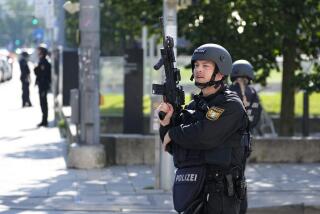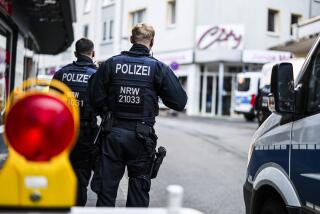Israelis Fire on Kurds as Mob Storms Consulate
BERLIN — Israeli security guards opened fire Wednesday on club-wielding Kurds who had stormed the Israeli Consulate here, killing three protesters, wounding 15 and provoking fears of escalating violence among the despairing, stateless people.
Incited by rumors that Israeli agents played a role in Turkey’s capture of Kurdish rebel leader Abdullah Ocalan, the angry Kurds descended on the elegant suburban villa housing the consulate in a reprisal that may foreshadow a season of deadly discontent as Kurdish protests spread as far away as Australia.
Several of those wounded by the gunfire here tried to flee, dripping trails of blood onto the snow-covered streets and sidewalks before being captured by arriving police reinforcements.
The fatalities were two men and a woman, said Berlin Police Chief Hagen Saberschinski, who declined to identify the dead or the wounded. He said 27 police officers were injured in the rioting.
Defiant even as rescue workers carried them away on stretchers, wounded Kurds flashed victory signs and vowed to fight on for Ocalan’s release from Turkey.
In Germany, where 400,000 Kurds make up the largest Kurdish community outside the ethnic group’s countries of origin, fear of escalating unrest gripped the country as despondent supporters of Ocalan resorted to brutal extremes to spotlight their plight.
“We have no other means with which to fight, and we have nothing left to lose,” said Zeynep Zara, who said she fears that European leaders’ tolerance of Turkey’s repression of its Kurdish minority has driven her people to desperation.
In Tel Aviv, Israeli Prime Minister Benjamin Netanyahu told a news conference that the security guards in Berlin fired on the protesters after they broke through the front door of the consulate and took an Israeli woman hostage. She was released after German police persuaded the Kurds to end their occupation in the face of thousands of police officers surrounding the neighborhood.
“Our men have standing orders to prevent with force--by opening fire, if necessary--any attempt to take hostages and, of course, to ensure their own self-defense,” Netanyahu said. “We regret any loss of life. It is tragic when such a thing happens, but . . . we are committed to the safety and well-being of Israeli facilities and citizens.”
Netanyahu repeated Israel’s categorical denials that the country’s Mossad spy agency played a role in Ocalan’s capture.
The wave of violence and extremism unleashed by the Kurds after the rebel leader’s arrest forced German police to step up security at other potential targets, overtaxing public safety resources, especially in ethnically volatile Berlin.
“Berlin police are overwhelmed. We’ve had to ask for reinforcements from elsewhere,” Saberschinski told reporters after the consulate confrontation, noting that 129 buildings housing U.S., Israeli, Turkish, Greek and Kenyan representative offices now need special protection. Ocalan had been hiding at the Greek Embassy in the Kenyan capital, Nairobi, until his arrest Monday. The United States has denied any “direct” involvement in his capture.
On Wednesday, Turkish businesses in several German cities were firebombed and rock-hurling protesters snarled traffic and commerce in major cities such as Cologne and Frankfurt. At least three Kurds--two of them young women--were fighting for their lives in hospitals after attempts at self-immolation.
Last fall, Chancellor Gerhard Schroeder, mindful of Germany’s sensitive mix of 2.3 million emigre Turks and Kurds, declined to invoke an outstanding arrest warrant for Ocalan when the guerrilla leader was then being detained in Italy. That would have spared Ocalan from being tried in Turkey, where he could face execution. German officials said at the time that they did not want to import the bitter ethnic confrontation into this country, but the escalating Kurdish outbursts suggest that the German leadership’s decision may have backfired.
Ocalan, head of the rebel Kurdistan Workers Party, or PKK, and the deadly 15-year Kurdish struggle for an independent homeland, was flown to Turkey on Tuesday to face trial on terrorism charges. His capture at the Greek Embassy a day earlier triggered angry and coordinated actions against Greek missions throughout Europe.
At the Kos-Ber clubhouse in Berlin’s heavily Turkish and Kurdish Kreuzberg district Wednesday, smoke and seething emotions filled the second-floor hall crowded with hundreds of PKK supporters. Swathed in fringed black-and-white scarves and milling about by the hundreds, the Kurds seemed unsure where to focus their anger until word spread alleging that Mossad intelligence agents had played a role in Ocalan’s capture.
About 100 Kurds carrying pipes, hammers and tree limbs descended on the five-story consulate building in the serene Grunewald suburb, overpowering a 30-strong city police force sent to the scene after police were tipped off about the impending attack, said Saberschinski, the police chief.
“There were clashes with the police, then about 20 of the protesters got into the entryway. Then suddenly I heard shots--first nine, then another five,” recalled eyewitness Lukas Bielinski, a 14-year-old walking his dog near the consulate at the fateful moment.
Elsewhere in Germany, Kurds took a member of Schroeder’s Social Democratic Party hostage in Hamburg, setting off a bloody confrontation between Kurdish demonstrators and police. Protests also turned violent in Frankfurt and Cologne, and police warned that they were losing their battle for “de-escalation” of the crisis.
Schroeder warned Kurds living in Germany against further “illegal actions,” and his spokesman, Uwe-Karsten Heye, called the Berlin shooting incident “shocking” and appealed for calm. Interior Minister Otto Schily threatened deportation of Kurds involved in violent protests.
But the attacks and the spilling of blood have ratcheted the tension level to dangerous new heights and given the fractured Kurdish community here a fresh grievance around which to unite.
“Not all Kurds agree with Mr. Ocalan or the PKK, but we all believe the Turkish government is trying to destroy him as a means of destroying the Kurdish people and their culture, and this we will never allow to happen,” said Munzur Cem, a Kurdish writer living in Berlin.
Ocalan’s arrest may prove a strategic mistake by Turkey because it will bring his supporters and enemies together in common cause, said Cem, charging that Turkish authorities are fomenting violence among the Kurds to discredit them in the eyes of the international community.
“Turks and Kurds do not normally fight each other here. It is more with the Turkish authorities that we have conflicts,” Cem said. “But no one can say what the situation will be tomorrow.”
Kurds in Germany warn that Turkish action against Ocalan will stimulate, rather than frustrate, their campaign for a homeland.
At least 50 Kurds holding a hostage at the Greek Embassy in London for a second day said they were waging a hunger strike, and 800 other Kurds were keeping a vigil outside the mission to support them.
Tensions mounted outside the London embassy with news of the deaths of the three Kurds and the airing of television footage of Ocalan in the hands of the Turks. The demonstrators held a minute of silence in memory of the dead.
“People have been very, very angry at the news of what is happening in Berlin,” said Zinir Hogir, a spokesman for the Kurds. “Also, the footage which has been shown on TV on chairman Ocalan--this confirms our fears. We have been trying to calm the people down, and it is going to be very difficult to continue that.”
Times staff writers Rebecca Trounson in Jerusalem and Marjorie Miller in London and researcher Christian Retzlaff in Berlin contributed to this report.
More to Read
Sign up for Essential California
The most important California stories and recommendations in your inbox every morning.
You may occasionally receive promotional content from the Los Angeles Times.










